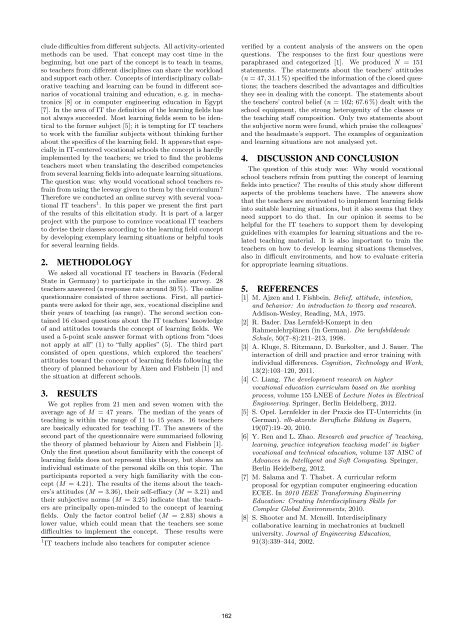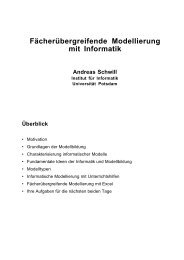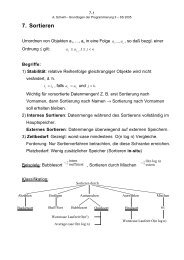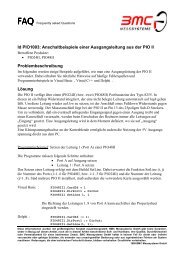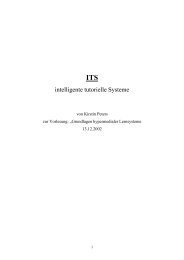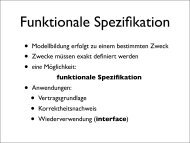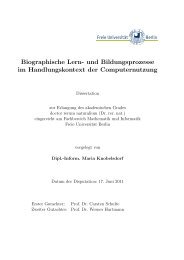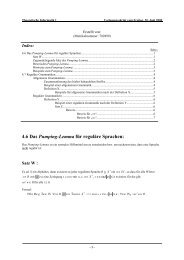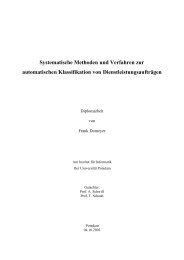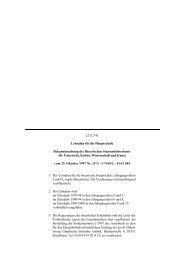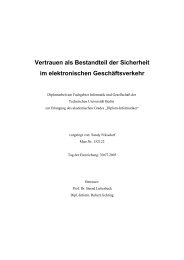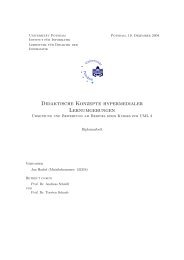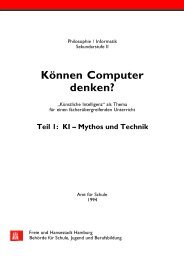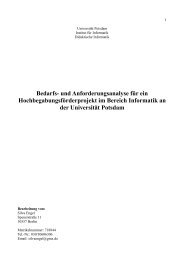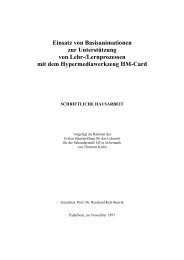Maria Knobelsdorf, University of Dortmund, Germany - Didaktik der ...
Maria Knobelsdorf, University of Dortmund, Germany - Didaktik der ...
Maria Knobelsdorf, University of Dortmund, Germany - Didaktik der ...
Create successful ePaper yourself
Turn your PDF publications into a flip-book with our unique Google optimized e-Paper software.
clude difficulties from different subjects. All activity-oriented<br />
methods can be used. That concept may cost time in the<br />
beginning, but one part <strong>of</strong> the concept is to teach in teams,<br />
so teachers from different disciplines can share the workload<br />
and support each other. Concepts <strong>of</strong> interdisciplinary collaborative<br />
teaching and learning can be found in different scenarios<br />
<strong>of</strong> vocational training and education, e. g. in mechatronics<br />
[8] or in computer engineering education in Egypt<br />
[7]. In the area <strong>of</strong> IT the definition <strong>of</strong> the learning fields has<br />
not always succeeded. Most learning fields seem to be identical<br />
to the former subject [5]; it is tempting for IT teachers<br />
to work with the familiar subjects without thinking further<br />
about the specifics <strong>of</strong> the learning field. It appears that especially<br />
in IT-centered vocational schools the concept is hardly<br />
implemented by the teachers; we tried to find the problems<br />
teachers meet when translating the described competencies<br />
from several learning fields into adequate learning situations.<br />
The question was: why would vocational school teachers refrain<br />
from using the leeway given to them by the curriculum?<br />
Therefore we conducted an online survey with several vocational<br />
IT teachers 1 . In this paper we present the first part<br />
<strong>of</strong> the results <strong>of</strong> this elicitation study. It is part <strong>of</strong> a larger<br />
project with the purpose to convince vocational IT teachers<br />
to devise their classes according to the learning field concept<br />
by developing exemplary learning situations or helpful tools<br />
for several learning fields.<br />
2. METHODOLOGY<br />
We asked all vocational IT teachers in Bavaria (Fe<strong>der</strong>al<br />
State in <strong>Germany</strong>) to participate in the online survey. 28<br />
teachers answered (a response rate around 30 %). The online<br />
questionnaire consisted <strong>of</strong> three sections. First, all participants<br />
were asked for their age, sex, vocational discipline and<br />
their years <strong>of</strong> teaching (as range). The second section contained<br />
16 closed questions about the IT teachers’ knowledge<br />
<strong>of</strong> and attitudes towards the concept <strong>of</strong> learning fields. We<br />
used a 5-point scale answer format with options from “does<br />
not apply at all” (1) to “fully applies” (5). The third part<br />
consisted <strong>of</strong> open questions, which explored the teachers’<br />
attitudes toward the concept <strong>of</strong> learning fields following the<br />
theory <strong>of</strong> planned behaviour by Aizen and Fishbein [1] and<br />
the situation at different schools.<br />
3. RESULTS<br />
We got replies from 21 men and seven women with the<br />
average age <strong>of</strong> M = 47 years. The median <strong>of</strong> the years <strong>of</strong><br />
teaching is within the range <strong>of</strong> 11 to 15 years. 16 teachers<br />
are basically educated for teaching IT. The answers <strong>of</strong> the<br />
second part <strong>of</strong> the questionnaire were summarised following<br />
the theory <strong>of</strong> planned behaviour by Aizen and Fishbein [1].<br />
Only the first question about familiarity with the concept <strong>of</strong><br />
learning fields does not represent this theory, but shows an<br />
individual estimate <strong>of</strong> the personal skills on this topic. The<br />
participants reported a very high familiarity with the concept<br />
(M = 4.21). The results <strong>of</strong> the items about the teachers’s<br />
attitudes (M = 3.36), their self-effiacy (M = 3.21) and<br />
their subjective norms (M = 3.25) indicate that the teachers<br />
are principally open-minded to the concept <strong>of</strong> learning<br />
fields. Only the factor control belief (M = 2.83) shows a<br />
lower value, which could mean that the teachers see some<br />
difficulties to implement the concept. These results were<br />
1 IT teachers include also teachers for computer science<br />
162<br />
verified by a content analysis <strong>of</strong> the answers on the open<br />
questions. The responses to the first four questions were<br />
paraphrased and categorized [1]. We produced N = 151<br />
statements. The statements about the teachers’ attitudes<br />
(n = 47, 31.1 %) specified the information <strong>of</strong> the closed questions;<br />
the teachers described the advantages and difficulties<br />
they see in dealing with the concept. The statements about<br />
the teachers’ control belief (n = 102; 67.6 %) dealt with the<br />
school equipment, the strong heterogenity <strong>of</strong> the classes or<br />
the teaching staff composition. Only two statements about<br />
the subjective norm were found, which praise the colleagues’<br />
and the headmaste’s support. The examples <strong>of</strong> organization<br />
and learning situations are not analysed yet.<br />
4. DISCUSSION AND CONCLUSION<br />
The question <strong>of</strong> this study was: Why would vocational<br />
school teachers refrain from putting the concept <strong>of</strong> learning<br />
fields into practice? The results <strong>of</strong> this study show different<br />
aspects <strong>of</strong> the problems teachers have. The answers show<br />
that the teachers are motivated to implement learning fields<br />
into suitable learning situations, but it also seems that they<br />
need support to do that. In our opinion it seems to be<br />
helpful for the IT teachers to support them by developing<br />
guidelines with examples for learning situations and the related<br />
teaching material. It is also important to train the<br />
teachers on how to develop learning situations themselves,<br />
also in difficult environments, and how to evaluate criteria<br />
for appropriate learning situations.<br />
5. REFERENCES<br />
[1] M. Ajzen and I. Fishbein. Belief, attitude, intention,<br />
and behavior: An introduction to theory and research.<br />
Addison-Wesley, Reading, MA, 1975.<br />
[2] R. Ba<strong>der</strong>. Das Lernfeld-Konzept in den<br />
Rahmenlehrplänen (in German). Die berufsbildende<br />
Schule, 50(7–8):211–213, 1998.<br />
[3] A. Kluge, S. Ritzmann, D. Burkolter, and J. Sauer. The<br />
interaction <strong>of</strong> drill and practice and error training with<br />
individual differences. Cognition, Technology and Work,<br />
13(2):103–120, 2011.<br />
[4] C. Liang. The development research on higher<br />
vocational education curriculum based on the working<br />
process, volume 155 LNEE <strong>of</strong> Lecture Notes in Electrical<br />
Engineering. Springer, Berlin Heidelberg, 2012.<br />
[5] S. Opel. Lernfel<strong>der</strong> in <strong>der</strong> Praxis des IT-Unterrichts (in<br />
German). vlb-akzente Berufliche Bildung in Bayern,<br />
19(07):19–20, 2010.<br />
[6] Y. Ren and L. Zhao. Research and practice <strong>of</strong> ’teaching,<br />
learning, practice integration teaching model’ in higher<br />
vocational and technical education, volume 137 AISC <strong>of</strong><br />
Advances in Intelligent and S<strong>of</strong>t Computing. Springer,<br />
Berlin Heidelberg, 2012.<br />
[7] M. Salama and T. Thabet. A curricular reform<br />
proposal for egyptian computer engineering education<br />
ECEE. In 2010 IEEE Transforming Engineering<br />
Education: Creating Interdisciplinary Skills for<br />
Complex Global Environments, 2010.<br />
[8] S. Shooter and M. Mcneill. Interdisciplinary<br />
collaborative learning in mechatronics at bucknell<br />
university. Journal <strong>of</strong> Engineering Education,<br />
91(3):339–344, 2002.


